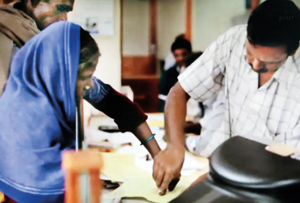One by one they trickled into the bank
The walk from the bus-stop to his workplace daily in central Delhi, India, was an eye-opener. He would pass a motley group of pavement hawkers and beggars.
Being not only a bank officer but also a “faithful” of the concept of moral re-armament (MRA) which encompasses honesty, purity, unselfishness and love, Joseph Santhumary Parthiban decided to step in. How do they survive, he wondered, certain that savings accounts in a bank would give them security and self-respect.

Parthiban in Colombo this week
The area was teeming with shoe-shine boys, tea-wallahs, waiters in the small kiosks which dotted the area and pan (betel), fruit and water-sellers, with lepers, those with disabilities and the elderly, engaging in their own “line of trade” which was begging.
Their plight smote Mr. Parthiban from Salem in Tamilnadu who was Manager of a state bank’s extension counter on Connaught Place in the late 1990s and early 2000s. Each and every one of them had converged on the capital with a dream – “to make it big in the metropolis”. Their situations back in their villages, the need to feed and educate their children, to get their daughters married, to build a small home, to buy a few pieces of jewellery for their wives and to provide medical care for elderly parents had compelled them to come to the buzzing city.
How much did they earn? What did they do with their money? Where did they stay as night fell on the city, intense heat or winter cold gripped it or the heavy monsoon rain lashed it?
Mr. Parthiban who was in Colombo this week says that he then made a conscious decision to make friends with them, by buying his newspaper from one particular hawker, his tea from another, a banana from a third, while putting coins into the palms of a beggar or two regularly.
Their life stories cut him to the quick and broke his heart – they laid their weary heads down for the night on the hard floor, seeking whatever shelter they could, not much though, from the shop awnings, the bridge close by or the temple, come rain, dew or frost.
They did earn money, one beggar in fact made about Rs. 500 (Sri Lankan Rs. 1,500) a day, more than a low-income state employee, but with no home to go to at nightfall, hawkers and beggars alike got trapped in the vice that was rampant on the city’s streets. Drug and alcohol abuse and prostitution, had caught them in its vice-like grip.
When the festivals came around, they had to go back home, maybe not laden with gifts, but at least with a few trinkets, and some money. They then got enmeshed in the web of the money-lender from which there was no release, even though they returned to undertake double the work they had done before. The interest on the “loans” kept mounting.

A pavement dweller giving her thumb-print before opening a bank account (Taken from YouTube video)
“The ignorance of the poor in saving or borrowing from the right source, kept them in debt forever,” says Mr. Parthiban.
As his “engagement” with them grew, he gently suggested the opening of bank accounts. Of course, he did not tell them that he worked at a bank, as they would have suspected his motives. They were reluctant though……..how could they, the riff-raff on the streets in their torn and unwashed clothes, walk into a posh bank like other well-dressed customers. Mr. Parthiban could only urge them to try, and leave it that.
He had already sounded out the bank’s Assistant General Manager who had given a nod to his idea while also briefing his staff on how to interact with them sensitively.
“Slowly they trickled into the bank,” he says, adding that hesitantly they would stand at the entrance and look in tentatively.
Recalling their surprise when they saw him seated in the Manager’s cabin, he says the understanding staff helped them fill out the forms with 300 Savings Accounts being opened in a week.
Devising another plan to lure them towards savings, Mr. Parthiban refers to a popular TV programme of the time titled, ‘Kaun banenga croepati’ (Who will make a millionaire) with the participation of Amitabh Bachchan which they tweaked to make ‘Hum banenga lakshapathi’ (We’ll become lakshapati – those owning 100,000 rupees). The plan was a recurring deposit, with a maturity value of one lakh of rupees which caught on among the hawkers and beggars.
For Mr. Parthiban the enlightenment about moral re-armament had come during his campus years when he was following his Bachelor of Arts in Economics at a Catholic university. An international team including Vijitha Yapa, former editor and owner of the chain of bookshops by the same name, was spreading the message. It caught the attention of Mr. Parthiban, a youth of 22 — the need for change, the need to help each other and that if you care enough and share enough, you’ll have enough.
The message, don’t wait for someone else to initiate change, and “let it start with you” got the young man thinking. His mind worked furiously and change started within him. Many library books he had “permanently” borrowed from the university now began weighing on his mind. He knew he had to do something – return the books.
Mr. Parthiban who was not just any student but the President of the College Union then met the Principal who was a priest and also the Librarian who was about to retire and quite befuddled how so many books had gone missing from his inventory.
The Principal who was known to have helped many navigate the difficult years of youth, was “understanding and compassionate”. The books were duly returned to their rightful place in the library.
There was, however, a chain reaction. He had not only told the Principal but also his friends what he was about to do and in came double the number of books. “When I’m honest, it has an impact on others,” says Mr. Parthiban with humility, adding, “It helped me to be accountable for money, to be someone who could be trusted and also someone who really cared for people.”
That was the beginning of a long journey, with Mr. Parthiban joining like-minded people at the Asia Plateau, the International Centre of Initiatives for Change, Panchgani, about 250km from Mumbai, a worldwide movement working for moral and spiritual renewal in all areas of life.
He was also among a group travelling across India (it was the time of the Indo-China War) and the world, who urged that Asia should not be known for the “blast of bombs or cry of suffering but the still small voice that can point people towards what is right”.
After obtaining his degree, his career began at the Taj Group of Hotels in Mumbai, followed by the long stint, with many transfers across huge India, until his retirement from the state bank recently.
From Delhi where he coaxed the hawkers and beggars to open savings accounts, Mr. Parthiban moved to a village in the south, mobilising the rural poor by paying visits to them on his mo-ped. Here too he did the same with self-help groups as well as encouraging vulnerable groups such as those affected by leprosy, HIV/AIDS or those having disabilities to form groups to negotiate loans etc.
To his surprise beggars too had joined the group and all have been rehabilitated and have moved up the ladder of life. They don’t beg any more but sell flowers or toys to earn a living, he says.
But for Mr. Parthiban, the “most satisfying period” of his life was his Delhi impact. One water-boy whom he found to have Indian Rs. 20,000-30,000 stuffed into his pockets after selling glasses of water began a savings account and is thriving now, he says, adding that fulfilment also came when a woman fruit-seller with tears in her eyes thanked him for guiding her to open a savings account.
“She had collected Indian Rs. 1.5 lakhs and given one daughter in marriage and begun another account to settle her second daughter. She hadn’t borrowed one paisa from the money-lender,” says this bank manager who has been interested in people and not numbers, with satisfaction. This ‘revolutionary’ banker takes the bank to the people rather than awaiting people’s presence at the bank.
When police attempt to harass them, the hawkers and beggars would cheekily pull out their bank pass books and tell them to deposit their “own” money in the accounts, smiles Mr. Parthiban, who has set off the chain reaction of ‘Banking for Change’, adding that they now have dignity and self-respect.
A tune for a future president of Sri Lanka
A Tamil wrote the tune for a Sinhalese and the Sinhalese was none other than Ranasinghe Premadasa (who would later become President of Sri Lanka). Mr. Parthiban had met Mr. Premadasa who was then in the Opposition in 1973 at the MRA Centre in Panchgani. When their paths crossed, as Mr. Premadasa was taking a walk, Mr. Parthiban had wished him Good Morning in English only to be surprised when the Sri Lankan politician slipped easily into Tamil.
During discussions as a group, Mr. Premadasa had produced a poem to which he wanted a tune and of two tunes written, one by Mr. Parthiban and the other by an English woman, he had liked that of Mr. Parthiban.
“We sang the song during the international meeting,” says Mr. Parthiban, adding, “I felt a closeness deep in my heart towards him”.



